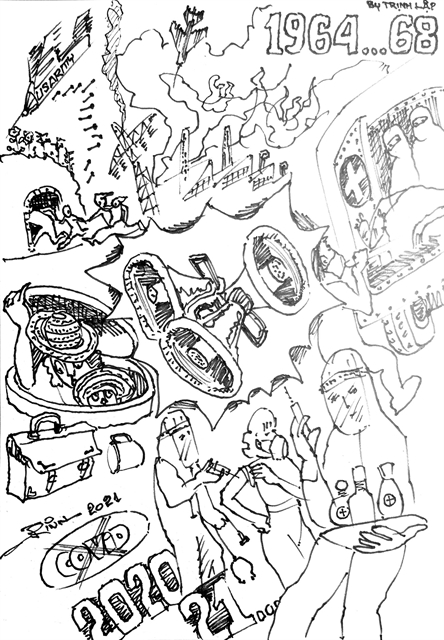 Talk Around Town
Talk Around Town

The famous public address system in Hà Nội seems to be on an historic mission again and is proving an effective channel to transmit urgent messages during the coronavirus pandemic, especially during social distancing.
By Lê Hương
The famous public address system in Hà Nội seems to be on an historic mission again and is proving an effective channel to transmit urgent messages during the coronavirus pandemic, especially during social distancing.
The PA system dates back to the 1960s when it was first used in Hà Nội to transmit authorities' information. During the American air war of destruction against North Việt Nam, multiple loudspeaker units were installed throughout the city to alert people of US air attacks. The system was also among the first to inform the people of victories on battlefields and when the war ended.

|
| Illustration by Trịnh Lập |
After war the system continued its job to convey information from ward-level government to local residents.
The loudspeakers would start with a marching song at 6am sharp, then came some announcements, pieces of current news and musical interludes. The broadcasting would last 15-20 minutes; then it resumes at 5pm when people return from work.
Ten years ago, I wrote a letter to the authorities of my ward to complain about 'noise pollution' from the loudspeakers.
As an editor, I always worked late at the newspaper. Sometimes, my night shift would end as late as 2am due to some breaking news, and I would want to sleep the next morning.
“I would highly appreciate it if the authorities would consider adjusting the broadcasting time for the PA system by one hour later to suit all people’s routines,” I wrote in the letter sent directly to my ward’s People’s Committee.
The noise pollution was not only a problem for me but also many others living in the city, who relied on more modern forms of communication, the city's FM radio or even the internet.
In late 2018, a survey by the Hà Nội Information Service showed that over 70 per cent of 800 respondents said they supported reducing the PA system to gradually putting it out of commission entirely.
Over 70 per cent said the number of loudspeakers should be reduced by half to ensure the broadcasting without disturbing families too much. They suggested keeping 5-10 clusters of loudspeakers in a district instead of the usual 10-20.
Pandemic revival
Since the end of April, the start of the fourth wave of the pandemic in Việt Nam, the PA system has shown its effectiveness.
Many elderly people in residential areas rely on the loudspeakers to get information, which includes pandemic progress in the area, vaccination schedules, prevention measures, symptoms of COVID-19, as well as what to do if you get the virus.
“I watch TV for national information, yet long for the loudspeakers for the pandemic situation in our neighbourhood,” said Hoàng Văn Diễm, a 70-something resident of Bách Khoa Ward in the capital’s Hai Bà Trưng District. “The information is so quickly and clearly announced.”
Diễm does not use a smart phone like the younger generations, so does not get messages on Zalo, Viber, Facebook or any other modern social media.
“I just want to know about what is happening around me, what the authorities offer and what kind of support I can get, who to contact if I need? I can get all that information from the loudspeakers,” he said.
The broadcasts come several times a day in the morning and afternoon, though in urgent situations, there may be more announcements made.
Nguyễn Thị Thanh Mai, a retiree, said the PA system was crucially helpful during social distancing.
“I cannot talk to my neighbours freely as before to get information,” she said. “So I can both do housework and listen to the local news.”
An Thanh Thảo, a civil servant in the People’s Committee of Cống Vị Ward, Ba Đình District, said that besides taking care of daily PA broadcasts she was also responsible for transmitting news on social networks and dealing with local resident feedback on the Bluezone app, a network for people living and travelling in Việt Nam to check on virus updates, run by the Ministry of Information and Communications and the Ministry of Health.
“Sometimes locals inform us of strange people in the area during social distancing,” she said. “The concerned agencies will then appear at the site and deal with the matter.”
Thảo said the loudspeaker system still had a function in modern times.
“We broadcast, and locals hear the necessary messages transmitted through the air,” she said. “I’m proud and happy to make my small contributions to the fight against the pandemic.”
The system is even more crucial in the outskirts districts of the city.
Nguyễn Thị Phương, deputy director of Hà Đông District’s Culture and Information Centre, said there were multiple horn loudspeaker units installed on electricity poles at 200-500 metre intervals in residential areas.
“In many wards, authorities set up Zalo groups to transmit information,” she said. “But the PA system is still more useful among the elderly and the poor, who cannot get access to the internet. I think the system is one of the cheapest, most effective ways for sending information these days.”
Elderly Diễm is adamant that this style of communication, old-fashioned as it might be, will help to win the ‘war’ against coronavirus. VNS

|




